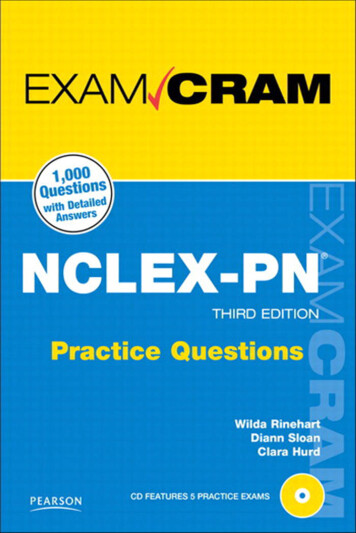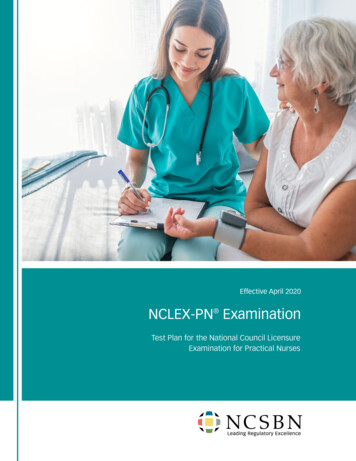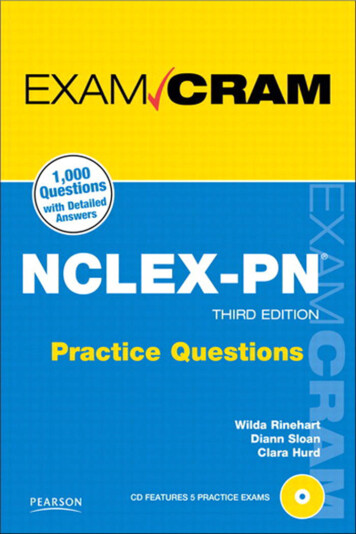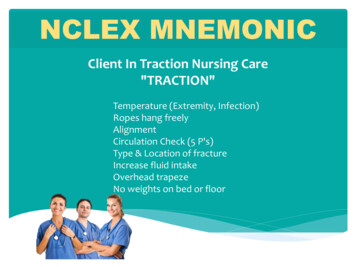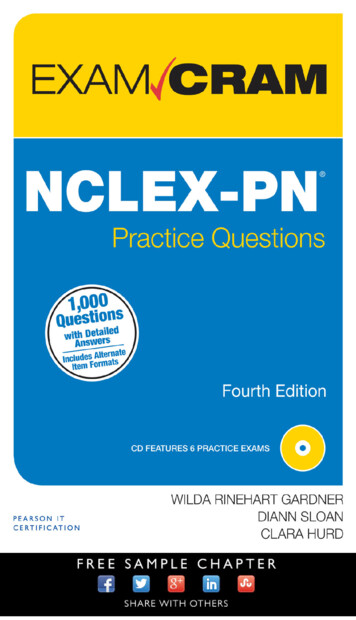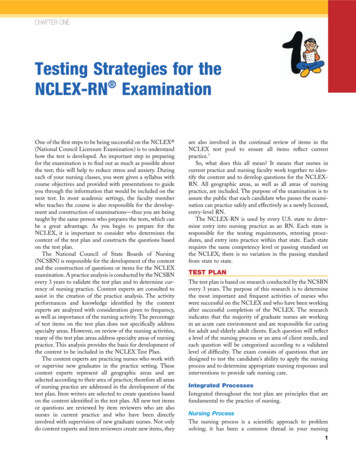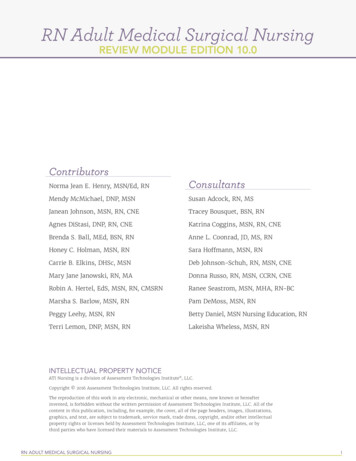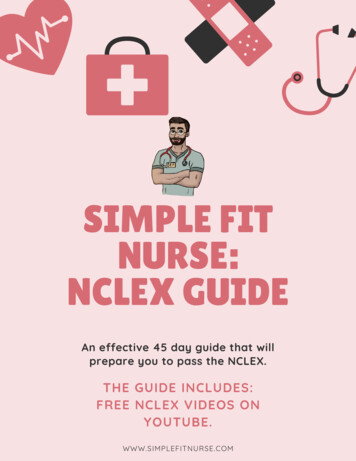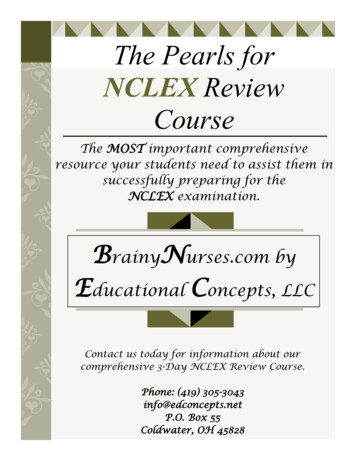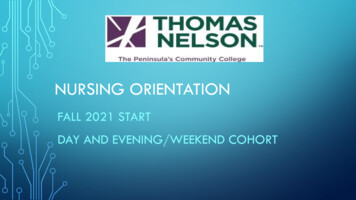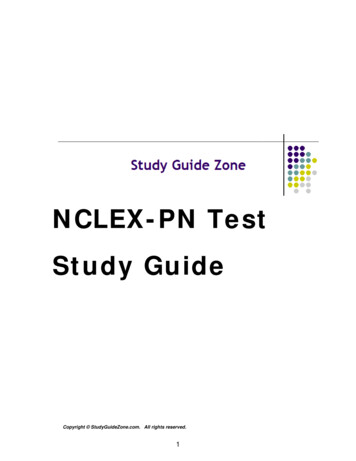
Transcription
NCLEX-PN TestStudy GuideCopyright StudyGuideZone.com. All rights reserved.1
TABLE OF CONTENTSNCLEX TEST RESOURCES. 4INTRODUCTION TO THIS GUIDE . 5TESTING AND ANALYSIS. 7INTRODUCTION TO THE NCLEX. 9THE NCLEX SCORING SCALE. 10GENERAL STRATEGIES. 11STRATEGY 1: UNDERSTANDING THE INTIMIDATION . 11STRATEGY 2: FINDING YOUR OPTIMAL PACE . 13STRATEGY 3: DON’T BE A PERFECTIONIST . 15STRATEGY 4: FACTUALLY CORRECT, BUT ACTUALLY WRONG . 16STRATEGY 5: EXTRANEOUS INFORMATION . 16STRATEGY 6: AVOIDING DEFINITES. 18STRATEGY 7: USING COMMON SENSE . 18STRATEGY 8: INSTINCTS ARE RIGHT . 19STRATEGY 9: NO FEAR . 19STRATEGY 10: DON’T GET THROWN OFF BY NEW INFORMATION . 20STRATEGY 11: NARROWING THE SEARCH . 20STRATEGY 12: YOU’RE NOT EXPECTED TO BE EINSTEIN . 21RESPIRATORY CONDITIONS . 21CIRCULATORY SYSTEM. 35COURSE OF CIRCULATION. 36THE HEART . 37CARDIOVASCULAR CONDITIONS. 40ARRHYTHMIAS REVIEW . 53CARDIAC FAILURE REVIEW . 55ENDOCRINE REVIEW . 57MICROBIOLOGY REVIEW . 68Copyright StudyGuideZone.com. All rights reserved.2
CHARACTERISTICS OF BACTERIA TYPES . 68IMMUNOGLOBULIN ISOTYPES . 74CYTOKINES REVIEW . 74PHARMACOLOGY . 78MEASUREMENT EQUIVALENTS. 87DRUG DISTRIBUTION. 90BIOTRANSFORMATION OF DRUGS . 93DRUG ELIMINATION. 94GENERAL PHARMACOKINETICS REVIEW. 96PHARMACODYNAMIC TERMS. 98AUTONOMIC NERVOUS SYSTEM RECEPTORS. 98SPECIFIC PEDIATRIC CONDITIONS . 99TUMOR REVIEW . 108GI REVIEW. 110EYE, EAR, AND MOUTH REVIEW . 118DISORDERS OF THE EYE . 118DISORDERS OF THE MOUTH . 121DISORDERS OF THE EAR . 123OBSTETRICS/GYNECOLOGY . 125DERMATOLOGY REVIEW . 133AXIAL SKELETON . 139APPENDICULAR SKELETON. 140MUSCULOSKELETAL CONDITIONS . 146SAMPLE QUESTIONS . 154ANSWER KEY . 174Copyright StudyGuideZone.com. All rights reserved.3
VALUABLE NCLEX RESOURCE LINKS . 181SPECIAL REPORT– QUICK REFERENCE LESION REVIEW . 182SPECIAL REPORT- HIGH FREQUENCY TERMS. 184DEFINITION OF ROOT WORDS . 190PREFIXES. 194SUFFIXES. 196NCLEX Test ResourcesFree NCLEX Practice Testshttp://www.testprepreview.com/nclex practice.htmFinancial Aid Factshttp://www.finaidfacts.orgScholarship Helphttp://www.scholarshiphelp.orgStudy Tips and Informationhttp://www.studyguidezone.com/resource tips.htmCopyright StudyGuideZone.com. All rights reserved.4
Introduction to this GuideYour NCLEX score is one of the most critical elements to yourqualification to become a nurse, so it is naturally much too importantfor you to take this test unprepared. The higher your NCLEX score,the better your chances of passing the boards.Careful preparation, as described in this expert guide, along with hardwork, will dramatically enhance your probability of success. In fact, itis wise to apply this philosophy not only to your board’s exam, but toother elements of your life as well, to raise you above the competition.Your NCLEX score is one of the areas in the licensure process overwhich you have a substantial amount of control; this opportunityshould not be taken lightly. Hence, a rational, prepared approach toyour NCLEX test as well as the rest of the licensure process willcontribute considerably to the likelihood of success.Keep in mind, that although it is possible to take the NCLEX more thanonce, you should never take the test as an “experiment” just to seehow well you do. It is of extreme importance that you always beprepared to do your best when taking the NCLEX. For one thing, it isextremely challenging to surmount a poor performance.If you arelooking to take a “practice” run, look into review course, professionallydeveloped mock NCLEX examinations, and, of course, this guide.This guide provides you with the professional instruction you requirefor understanding the traditional NCLEX test. Covered are all aspectsof the test and preparation procedures that you will require throughoutthe process. Upon completion of this guide, you’ll have the confidenceCopyright StudyGuideZone.com. All rights reserved.5
and knowledge you need for maximizing your performance on yourNCLEX test.Copyright StudyGuideZone.com. All rights reserved.6
Testing and AnalysisIt won’t take you long to discover that the NCLEX is unlike any testyou’ve taken before, and it is probably unlike any test you will evertake again in your academic career. The typical high school or collegetest is a knowledge-based test. The NCLEX, however, is applicationbased.What does this mean to you? It means that you’ll have to prepareyourself in a completely different way! You won’t simply be recitingmemorized facts as they were phrased in some textbook, and youwon’t be applying any learned formulas to specific problems that willbe laid out.The NCLEX requires you to think in a thorough, quick and strategicmanner and still be accurate, logical and wise. This test is designed tojudge your abilities in the ways that the licensure boards feel is vital tothe success of first year nursing graduate.To some extent, you have already gradually obtained these abilitiesover the length of your academic career. However, what you probablyhave not yet become familiar with is the capability to use theseabilities for the purpose of maximizing performance within the complexand profound environment of a standardized, skills-based examination.There are different strategies, mindsets and perspectives that you willbe required to apply throughout the NCLEX. You’ll need to beprepared to use your whole brain as far as thinking and assessment isconcerned, and you’ll need to do this in a timely manner. This is notCopyright StudyGuideZone.com. All rights reserved.7
something you can learn from taking a course or reading a book, but itis something you can develop through practice and concentration.The following chapters in this guidebook will lay out the format andstyle of the NCLEX as well as give you sample questions and examplesof the frame of mind you’ll be expected to take. If there is one skillthat you take with you from your preparation for the NCLEX, thisshould be it.Copyright StudyGuideZone.com. All rights reserved.8
Introduction to the NCLEXThe purpose of the NCLEX is to establish a standard method ofmeasurement for the skills that have been acquired by nursing schoolgraduates. These skills are considered critical to the healthcareprofession. The principle behind the NCLEX is similar to the SAT’s thatare required for application to American colleges. Although these testsare similar experiences in some respects, the NCLEX is a much morechallenging and complex.Fortunately, the NCLEX does not change very dramatically from yearto year. What this means to you, is that it has become possible forquality practice tests to be produced, and if you should take enough ofthese tests, in addition to learning the correct strategies, you will beable to prepare for the test in an effective manner.The NCLEX is not just a multiple-choice test. Fill in the blankquestions and multiple right answer questions have been added to thetest. Although these types of questions are not the majority ofquestions asked on the NCLEX. The main point is that the content hasstayed the same. The nursing principles tested prior to these changesare still the same. The content has remained relatively the same. Ifyou understand the content material of the exam, the type of testingquestion won’t matter.Copyright StudyGuideZone.com. All rights reserved.9
The NCLEX Scoring ScaleThe minimum number of questions asked on the NCLEX-PN exam is85. The maximum number of questions is 205. The exam is offered inCAT format which means the difficultly of the questions variessignificantly. If you miss a question, the computer will give you aneasier question. If you get it right, then you will get harder questions.Many NCLEX test takers freak out if computer shuts off after 85questions, or if they have to take the maximum number of questions.The main point is to be prepared to go the distance. Don’t be sprinterand concentrate for 100 questions and then let your concentrationbegin to fade. Likewise, don’t stress on how many questions you haveto
CAT format which means the difficultly of the questions varies significantly. If you miss a question, the computer will give you an easier question. If you get it right, then you will get harder questions. Many NCLEX test takers freak out if computer shuts off after 85 questions, or if they have to take the maximum number of questions.
